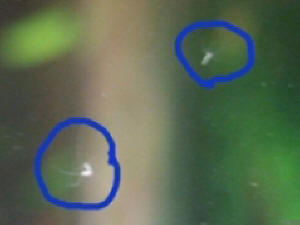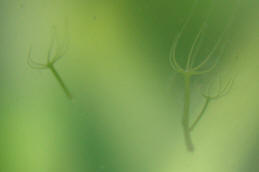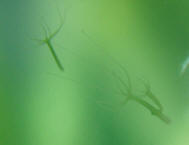What are these??? FW Jellies!
Video Link
8/9/16
I have just found these swimming in my 3 gallon freshwater tank! The
only creatures I have are 2 ADF, 1 Oto Cat, and a snail. I am quite
perplexed and hope that you can help! I have taken them out and placed
them in another container, just in case.
<Neat! These are freshwater jellyfish... My guess is on Craspedacusta
sowerbii, a Hydrozoan. Some folks keep these for their own sake. Bob
Fenner>
Thank you!!
Christine
Re: What are these??? FW Jellies 8/10/16
Where did they come from??
<Likely either a live food or plant source... or strobilized on a hard
substrate you bought "wet">
They are so tiny! Will they do any harm if I place them back into the
tank?
<Mmm; not likely; no>
Or should I just keep them in the separate container that they are in
now?
<Try searching the name I've given you. Cheers, BobF>
Christine
Establishing a freshwater hydra aquarium question.
4/5/15
I know most people don't want them in their tank, but I think they are neat, and
have always wanted to set up a tank that featured them that made observing them
easy (using magnifying glasses Etc.)
<They are indeed neat animals, ideally suited to windowsill tanks where algae
and infusoria bloom, then add a few Daphnia to feed on those, and together these
will be providing just the right conditions for Hydra to feed and grow.>
The ONLY problem I have had is I have NEVER ever found one when going out
looking for them. I've spotted freshwater bryos, freshwater sowerby jellies Etc. I
even discovered our local lake is full of nocturnal glass shrimp, but for
whatever reason I've never spotted a single hydra.
<Hydra are difficult to see in their natural habitat. They are transparent of
course, and very small, but they also culture algae inside their tissues for
sustenance, much like corals do. All these factors mean they're a lot easier to
see in the aquarium than in the wild.>
I've looked in rivers, creeks, lakes, ponds and swampy pools, where they are
supposed to be, but nothing.
<They are probably there, you just aren't seeing them. The "trick" is to collect
likely objects that they'd encrust, examine these at home in an aquarium you can
observe closely, and then discard or retain such objects as needs be. Do you
have access to "Pennak's Freshwater Invertebrates of the United States: Porifera
to Crustacea"? You can read the relevant
sections in Google Books as it happens, and there's plenty on collecting and
culturing these animals.>
I know hydra are super tiny, but if I am able to spot barely visible copepods
and water fleas smaller than a period swimming around in the water, I'd should
be able to see a hydra. LOL
Is there a trick to finding a hydra in the wild?
<See above.>
Any tips would be greatly appreciated!
Johnny
<Good luck! Neale.>
Re: establishing a freshwater hydra aquarium question.
4/6/15
Hey thanks for answering. The one thing I haven't done is take samples out of
the wild and leave them in a viewing tank in order for the hiding hydras to
reveal themselves. LOL
<Ah! Well, good luck finding the Lernaean Hydra. Cheers, Neale.>
|
Question: Help me ID these zooplankton? in my
freshwater tank! 5/4/09
Hello,
I was observing my 16gallon tropical freshwater tank today and
noticed what first appeared to be small translucent white debris
on the inside of the aquarium wall.? Upon closer observation, I
realized that these are some sort of plankton stuck on the wall
of the tank, probably about 0.25mm body with 5 thin, longish
tentacles sticking out from them.? I am noticing that these
tentacles are ever so slightly moving, extending, then curving
towards the "body", as if marine corals or sea anemone
might feed.
<They're a Cnidarian called Hydra, and yes, they are
somewhat closely related to corals and anemones, though
surprisingly perhaps, more closely related to the Portuguese Man
o' War.>
I tried my best to photograph these guys and circled them on
Photoshop.?
I've found what appears to be copepods in my tank before...
which are pretty well known and there are plenty of photos on the
web to help ID them.? But these things, I have no clue what they
are, or whether they are beneficial, harmless, or harmful.?
<Somewhere in the middle. Hydra can and will eat baby fish,
potentially as large as newborn Guppies, and would probably also
be a threat to newly hatched freshwater shrimps as well. On the
other hand, they are too small to be of any threat to adult
fish.>
I hope you will be able to help ID them!? Thank you so much in
advance.
Sascha
<Fascinating animals, and well worth observing! Cheers,
Neale.
|
 |
| Freshwater Aiptasia? Almost As Bad.... Hydra! -
04/29/2006 Hi Crew, <Hi, Monte!> I have a question, Is
there such a thing as Fresh Water Aiptasia? <No, but I know
EXACTLY where this is going.> I have what appears to be several
small Aiptasia on my plants and tank walls. The main single body is
green and it has about four to five tentacles on top. They are to
small right now for a good picture but as soon as I can get one I
will forward one to you. <No need, I can tell you precisely what
they are from your description. If I'm wrong on this, I'll
buy you a drink (but you'll have to come to Santa Cruz to cash
in on it!). They're Hydra.> Also I have some very small flea
looking bugs down around the gravel, they're white, oval and
very fast, they don't seem to be hurting anything just
wondering what they might be and if I should try to eradicate them.
<Not sure on these, perhaps Daphnia or Moina.... there are VERY
many small invertebrates that fit this description. They're
probably completely harmless.> Here are the tank inhabitance:
75gal planted tank These are the only survivors of many fish, (Too
many, Too fast, Too quick). <You've learned your lesson, I
trust?> Two silver hatchets Two Otos <When/if the Hydra
"take over", the Otos may suffer "stings" from
them.> Plants: Duckweed Java Fearn Dwarf Sagittaria Anubias
Barteri Vallisneria Spiralis Cryptocoryne Wendtii, Red I'm
working on getting it ready for four to five Discus and a school of
about 30 Cardinal tetras. It's been running for about three
months now and I've been back and forth with algae blooms.
<To be expected with new-ish tanks.> I believe I have that
under control as of now, but it will be a few more months before I
purchase the Discus and Cardinals as I'm waiting on two large
pieces of Malaysian drift wood. <Sounds nice.> Any help would
be much appreciated. <I, personally, would eliminate the Hydra
for a few reasons. For one, you can't share plants with folks
who don't want Hydra. For two, those Otos may suffer for
'em. For three, the discus may have trouble with their young
getting damaged or killed by Hydra, should they choose to
reproduce. Please take a look here to find my experience with
eradicating Hydra with Fenbendazole: http://wetwebfotos.com/talk/thread.jsp?forum=46&thread=10186&message=83268
(incidentally, I'm "vintage_fish" in the forum.)>
Keep up the great work. <Thanks, mate!> <Wishing you well,
-Sabrina> |
|
 
|
Freshwater things - 01/09/2006 Not sure if you can
help without a picture; recently some little (1/4"-) things
growing on the wall of the aquarium. they look like a cross between a
tube worm and anemone (sp?)- little tube like body with 5 arms waving
in the currents. any ideas? >> It is a freshwater invertebrate
called Hydra, it is harmless for larger fish but will eat and kill
small fry. You should be able to get rid of them by not feeding your
fish for 4-5 days. If you have many of them you may be overfeeding your
fish. Good Luck, Oliver
Hydra, discus Hello, I really need to know something bad I
have had from time to time in my discus tank which is a 125 gallon with
a 350 magnum and two double bio wheels on back, tank has been up for
2and 1 half years do water changes ones a week on it 35 gallons at a
time. my fish have darted around and had to dip one in salt before I
noticed today one was darting again, last week I saw some things on
glass quite a few look like hydra (octopuses) trying to buy
Flubendazole? do you have some or no ? do you think this is my problem?
have had a lot of my fish for as long as the tank but have lost some
too,, Hexamita?????? you have a great site this is my first time on
looked for information on this could not see sorry to bother but looks
like your the man????? thanks Kathy < First of all I would do some
water quality tests to start. Check the ammonia, should read zero.
Second check the nitrites, should also read zero. Then the nitrates,
should be less than 25 ppm. With the BioWheels the ammonia and nitrite
should not be a problem. If the nitrates are a problem then they need
to reduced with either larger or more frequent water changes. Service
the filters. I know that servicing these canister filters can be a
hassle but a filter only collects waste so it can removed by you and
taken out of the system. I would vacuum the gravel too. This gets rid
of all kinds of waste that can contribute to a nitrate problem. Now
that we know the water is clean the fish should be looking better and
have more resistance to disease. Watch your feeding so all the food is
getting eaten in a couple minutes each time. If the problem persists
then I would start looking at the pH. A high pH can be irritating to a
fish use to soft acidic water from the Amazon. An RO unit may be needed
to soften and acidify the water. The water temp should be around 80
degrees. Clean ,warm, soft acidic water should have your discus looking
and acting like true champs. But if there is still a problem and they
are not getting better then I would isolate the fish in a quarantine
tank and treat with Kanamycin. The hydra by themselves are no danger to
your discus unless you have small babies in the tank. Once you take
care of all the environmental factors then I think your hydra will go
away with the other problems.-Chuck>
|
|

